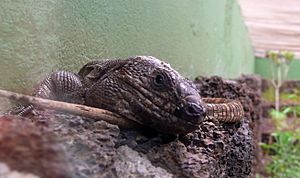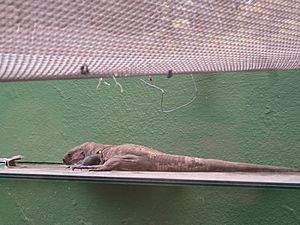Gallotia simonyi facts for kids
Quick facts for kids Gallotia simonyi |
|
|---|---|
 |
|
| El Hierro giant lizard (Gallotia simonyi machadoi) | |
| Conservation status | |
| Scientific classification |
|
| Kingdom: | Animalia |
| Phylum: | Chordata |
| Class: | Reptilia |
| Order: | Squamata |
| Family: | Lacertidae |
| Genus: | Gallotia |
| Species: |
G. simonyi
|
| Binomial name | |
| Gallotia simonyi (Steindachner, 1889)
|
|
| Script error: The function "autoWithCaption" does not exist. | |
| Synonyms | |
|
See text |
|
Script error: No such module "Check for conflicting parameters".
The Gallotia simonyi, also known as Simony's lizard, is a type of lizard that belongs to the lacertid family. These lizards used to live on many of the Canary Islands.
Sadly, one of the two types (subspecies) of this lizard is now extinct. The other type, called the Roque Chico de Salmor giant lizard, now only lives in a few small areas. These areas are cliffs with not much plant life. Today, you can find them at the southern end of the Risco de Tibataje. This specific spot is called la Fuga de Gorreta, and it's between Guinea and Paso del Pino. This area is about four hectares big.
Good news! In 1999, some of these lizards were brought back to the Roque Chico de Salmor. More reintroductions have happened since then. They have been released in places like Julan and la Dehesa.
Contents
What Simony's Lizards Eat
Simony's lizards are omnivorous. This means they eat both plants and animals. They enjoy plants like verode and Lavandula abrotanoides. They also like to munch on insects.
Life Cycle and Reproduction
The mating season for these lizards starts in May. The female lizards lay their eggs from June until the end of August. Each female can lay between 5 and 13 eggs. After about 61 days, the eggs hatch, and baby lizards emerge!
Why They Are Called Simony's Lizards
The scientific name for this lizard, simonyi, was chosen to honor a naturalist named Oskar Simony. He was from Vienna and lived from 1852 to 1915.
Different Types of Simony's Lizards
There are two main types, or subspecies, of Simony's lizards:
- The Roque Chico de Salmor giant lizard, known scientifically as Gallotia simonyi simonyi. This subspecies is now extinct. It disappeared around the 1930s.
- The El Hierro giant lizard, or Hierro giant lizard. In Spanish, it's called Lagarto Gigante de El Hierro. Its scientific name is Gallotia simonyi machadoi.
Protecting Simony's Lizards
There are only about 300 to 400 Simony's lizards left in the wild. This number includes the lizards that have been reintroduced to new areas. Because there are so few of them, they are listed as critically endangered. This means they are at a very high risk of disappearing forever.
The biggest danger to these lizards is being hunted by cats that live in the wild. They might also be hunted by dogs and rats. People are working hard to protect these special lizards and help their numbers grow.
See also
 In Spanish: Lagarto gigante de el Hierro para niños
In Spanish: Lagarto gigante de el Hierro para niños
 | Audre Lorde |
 | John Berry Meachum |
 | Ferdinand Lee Barnett |



